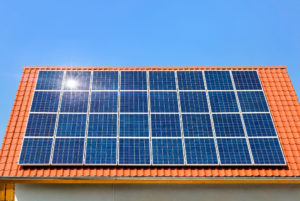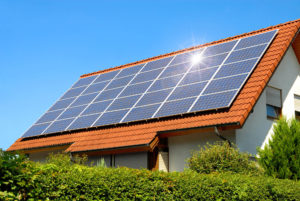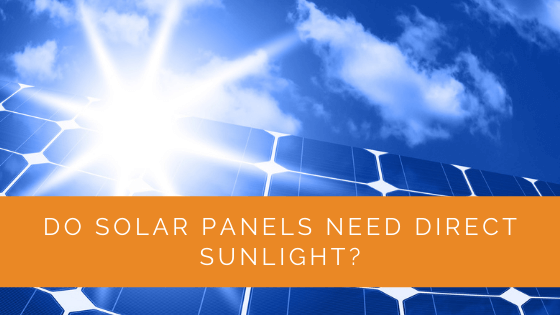Solar panels are some of the most useful pieces of tech developed in modern history. These panels take in sunlight or solar energy and convert it into electrical energy for our use. Solar energy is one of the cleanest forms of energy.
This cost-effective energy solution is one of the easiest ways to save money. Install these panels on your roof, and all your energy-related issues will be solved immediately. Such features are the reason why we hear so much about solar panels in the news today!
While solar panels have been around for over a century, there are many doubts and inhibitions about their mechanisms. One of the biggest questions people have about solar panels is how efficient they are in the shade, with little to no sunlight and if they generate power or electricity at night.
Since it is clear that solar panels convert sunlight into electricity for our use, people wonder if these panels use direct sunlight to work too. If you, too, are wondering how weather conditions affect the way solar panels perform, then you are in the right place.
Continue reading to find out how solar panels perform on cloudy days and if they do, in fact, need direct sunlight to work!
Contents
- 1 Key Takeaways
- 2 Do You Need Direct Sunlight For Solar Panels To Work?
- 3 Does Shade Reduce Solar Panel Efficiency?
- 4 Can Solar Panels Generate Energy in the Rain?
- 5 Can Solar Panels Work at Night?
- 6 Case Study: Enhancing Solar Efficiency in Cloudy Conditions
- 7 Expert Insights From Our Solar Panel Installers About “Do Solar Panels Need Direct Sunlight?
- 8 Experience Solar Excellence with Us!
- 9 To Conclude With
Key Takeaways
- Solar panels do not require direct sunlight to work efficiently; they can produce electricity even on cloudy days, although their output will be lower without direct sunlight.
- Shading from objects like trees or prolonged cloudy weather can reduce the efficiency of solar panels. The type of technology used and your inverter setup also play a role in how shading affects panel performance.
- Solar panels cannot generate energy at night due to the absence of sunlight, but excess daytime energy can be sent to the grid for credits or stored in batteries for use during nighttime or low-output periods.
Do You Need Direct Sunlight For Solar Panels To Work?
The quick answer is no; solar panels do not need direct sunlight to work once installed. They are meant to be used in direct sunlight, but they can produce electricity even without it. The mechanism is rather simple once you understand how the silicon photovoltaic cells in the solar panels work.
When we say solar panels absorb sunlight to produce electricity, we are actually talking about the photons emitted by the sun. Photons are light particles that are present in the rays of the sun or sunlight. Even when there is no direct sunlight available, there are still light particles present around us.
Solar panels work on the principle of converting these photons into electricity. So, even when the weather conditions are cloudy, your solar panels will still be able to produce energy with the help of the available sunlight.
There is one catch, though. Even though your panels will readily produce energy, the amount of power they form using sunlight will be significantly lower. On average, solar panels need 1000 W/m2 of sunlight to achieve their peak production rate or output.
If the weather is cloudy or trees cover your solar panels, it will be difficult for them to absorb that much energy from the sun. This will result in reduced energy production and downgrade your solar panel’s performance.
For your solar panel to work at its maximum efficiency, you will need direct sunlight. So, your solar panels will work in the shade, however, with reduced efficiency!

Does Shade Reduce Solar Panel Efficiency?
The answer is yes; shading can reduce efficiency; if you have trees planted on your property or around your solar panels, then your solar panels will produce reduced amounts of electricity. This is also true when you experience shading because it is cloudy outside.
While shaded areas can help reduce heat production in your panels, they can significantly lower your output rates too. The amount of energy produced by your solar panels when it is shady depends on multiple factors. Here’s what they are!
Type of Technology
The type of tech used in your solar panels determines their ability to react to shade and cloudy weather conditions. If your solar panels are relatively new, there are chances that your panels were built using the half-cut photovoltaic cell technology. This tech enables the panel to reduce the effect of the shaded areas.
How Long Does the Shade Last
The duration for which this shade lasts also determines the degree of drop in your electricity production. Solar panels produce significantly less electricity when the shade or cloudy weather lasts for long periods. Too much shade will certainly reduce power production, and your solar panels will work at a lower efficiency without reaching their peak even after hours of converting energy.
What your Inverter Set-up is Like
Your inverter set-up could affect the output of your complete solar panel system. For example, if you have MLPEs – microinverters or DC power optimizers, you will not experience any major reduction in the power produced.
For example, if there is shade on one panel of your system, it will not affect the others, and the rest of the panels can produce more electricity. On the other hand, if your inverter system is a central string set-up, if even one panel in your set-up is under the shade, the entire system will get affected, and you will have reduced energy production.
It is essential to understand your surroundings, weather conditions, and even the number of trees that go about your house before you set up a solar panel system in your home. Without this knowledge, you will have a hard time reaping the maximum benefits from your solar panels.
Can Solar Panels Generate Energy in the Rain?
The intensity of the sun’s rays determines how much energy your solar panels will help you produce. The sun does not give out the same amount of energy all year round. This renewable energy source gives out varying degrees of solar energy in different seasons.
So, you are bound to notice a change in the amount of power generated by your solar panels in different seasons. Here is how different seasons can affect the amount of energy produced by your solar panels.
Rain or Hail
Solar panels will not stop producing electricity when it starts raining. The photovoltaic cells on the panels use photons or light particles to generate this power. So, even when it is raining, there will still be a little bit of light which can be used to generate electricity.
Snow
A little bit of sunlight can still pass through snow, and if there isn’t a thick cover of snow all over your solar panels in the winter, your solar panel system will still generate electricity for you. Once installed, all you have to do is look after your solar panel systems and cover maintenance costs.

Cloudy Weather
Clouds are very unpredictable, and often it is hard to tell how long they will be hovering over your house. However, even if clouds cover your solar panels, it does not mean they will stop generating electricity. Solar panels produce electricity even on cloudy days.
The sun will find a way to pass through the thick canopy of clouds and reach your solar panels. So, even if the clouds bring rain, your solar panels will still produce electricity.
Windy
When you hear of strong wind in the news, you are immediately concerned about how it would affect your solar panels. While winds have the potential to damage panels, with the help of new-age technology, it is now easier than ever to prevent damage from strong wind and still harness sunlight as a form of renewable energy. Wind can also help clear out cloudy days, which would help boost your energy production.
Can Solar Panels Work at Night?
Since there is no sunlight at night, there is no way solar panels can convert solar energy into electricity. It is impossible to generate electricity through this natural source, but this does not mean you will be left in the dark at night.
There are ways in which solar panels save energy during the day and provide people with electricity at night. Solar panels are made of silicon cells that absorb as much sunlight they can from the sun’s rays during the day.
All the excess energy is sent to the grid, and you receive tokens in exchange for the electricity you deposit. You can then use these tokens to get electricity from the grid at night. This is known as net metering, and it can help you save a lot on bills and cut down on the energy costs of your property.
Another way to use solar energy from the sun is to store it using a solar battery. Solar cells produce and then store excess energy in batteries which can be used later on at night or when the output is not up to the mark. These techniques will help you use power wisely and even cost you less.
Case Study: Enhancing Solar Efficiency in Cloudy Conditions
Background
At Solar Panels Network USA, we encountered a client concerned about the efficiency of solar panels in their predominantly cloudy region. They had reservations about investing in solar energy due to the frequent lack of direct sunlight.
Project Overview
The goal was to design and install a solar panel system that could maximize energy production despite less than ideal weather conditions. Our team needed to address the client’s concerns by demonstrating the reliability and efficiency of modern solar technology.
Implementation
We began by conducting a detailed site assessment to understand the environmental factors affecting the location. This included evaluating the shading from nearby trees and buildings, as well as the typical cloud cover throughout the year.
Technology Selection:
We chose solar panels equipped with half-cut photovoltaic cell technology. These panels are designed to reduce the impact of shading and maintain higher efficiency in diffuse light conditions.
Inverter Setup:
To further enhance the system’s performance, we opted for microinverters. This setup ensures that each panel operates independently, minimizing the overall impact if one panel is shaded.
Panel Placement:
Strategic placement was crucial. We installed the panels at angles optimized for maximum exposure to available sunlight, considering both direct and indirect light paths. This configuration helped in capturing the most sunlight possible, even during overcast days.
Energy Storage:
We included a robust battery storage system to store excess energy generated during sunnier periods. This stored energy could then be used during cloudy days and at night, ensuring a consistent energy supply.
Results
The installation proved to be a success. Despite frequent cloudy conditions, the solar panel system consistently generated significant amounts of electricity. The microinverter setup ensured that shading on one panel did not drastically affect the entire system’s performance.
Our client reported a noticeable decrease in their energy bills, validating their investment in solar energy. The battery storage provided a reliable backup, ensuring they had power even during extended periods of low sunlight.
Summary
This case study highlights the importance of leveraging advanced solar technologies and strategic planning to overcome environmental challenges. At Solar Panels Network USA, we demonstrated that solar panels do not necessarily require direct sunlight to be effective. By using cutting-edge technology and thorough site assessments, we can ensure efficient energy production in various weather conditions, proving that solar power is a viable solution even in less sunny regions.
Expert Insights From Our Solar Panel Installers About “Do Solar Panels Need Direct Sunlight?
Our modern photovoltaic systems are designed to maximize efficiency even on cloudy days. While direct sunlight offers peak performance, our panels can still generate significant energy without it. It’s all about the quality of the technology used.
Senior Solar Technician
The key is understanding that solar panels utilize photons from sunlight. These light particles are present even on overcast days, allowing your panels to continue producing electricity. This makes solar a reliable energy source regardless of weather.
Lead Solar Engineer
One of the common misconceptions is that solar panels don’t work in the shade. They do, but with reduced output. Advanced setups with microinverters or power optimizers can mitigate these effects, ensuring you still get considerable energy production.
Solar Installation Specialist
Experience Solar Excellence with Us!
Trust in Solar Panels Network USA, where our seasoned experts deliver top-quality solar solutions for homes and businesses nationwide. With a legacy of countless successful installations and a commitment to sustainable energy, we’re your reliable partner in the solar journey. Ready for a brighter, eco-friendly future? Call us now at (855) 427-0058 and harness the power of the sun!
To Conclude With
Solar panels work in the presence and absence of direct sunlight. The cost of setting them up may seem like an investment. However, they help you save a ton of money in the long run.
Be it wind, rain, or snow; solar panels work in every situation as long as there is light available for the cells to absorb. However, if you think the performance of your solar panels has degraded significantly due to shaded weather conditions, you must contact the solar panel company and voice your concerns.
It is also advised that you assess your physical surroundings first before you buy a solar panel system. Reviews are also an excellent way to pick recommended solar panels. Reading reviews written by former customers will help form better decisions!
About the Author
Solar Panels Network USA stands at the forefront of solar energy solutions, driven by a team of seasoned solar engineers and energy consultants. With over decades of experience in delivering high-quality solar installations and maintenance, we are committed to promoting sustainable energy through customer-centric, tailored solutions. Our articles reflect this commitment, crafted collaboratively by experts to provide accurate, up-to-date insights into solar technology, ensuring our readers are well-informed and empowered in their solar energy decisions.

